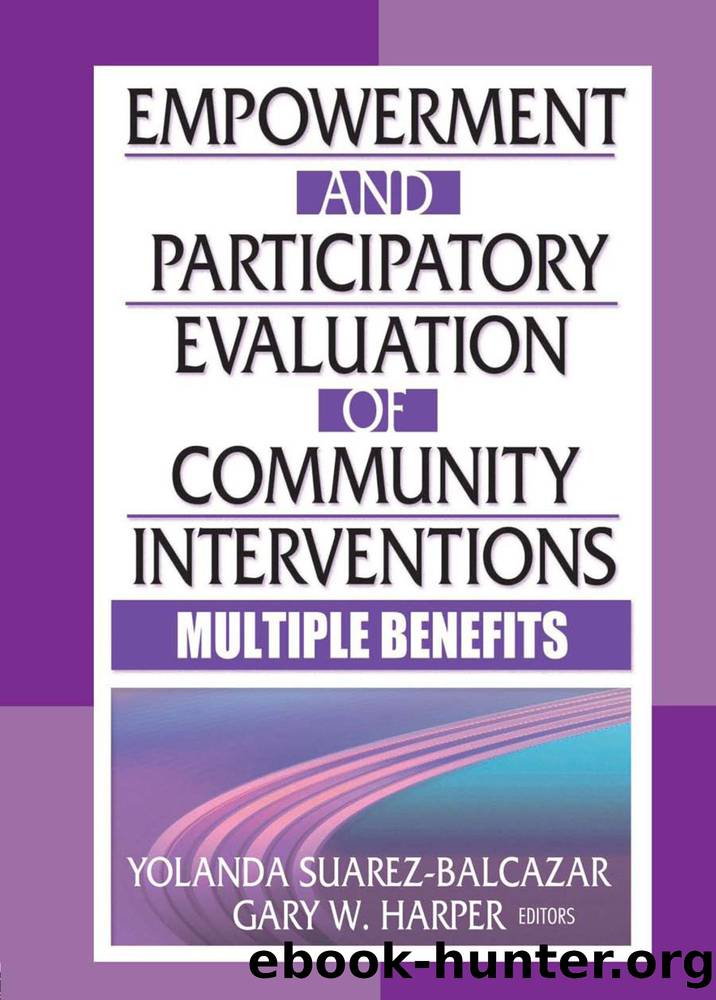Empowerment and Participatory Evaluation of Community Interventions by Suarez-Balcazar Yolanda;Harper Gary; & Gary W. Harper

Author:Suarez-Balcazar, Yolanda;Harper, Gary; & Gary W. Harper [Suarez-Balcazar, Yolanda & Harper, Gary W.]
Language: eng
Format: epub
Publisher: Taylor & Francis Group
Published: 2022-08-15T00:00:00+00:00
Introduction
Process evaluations are gaining increased recognition as a means through which information can be garnered regarding the delivery of services to intended populations and the nature of such services (Gottfredson, Fink, Skroban, & Gottfredson, 1997; Miller & Cassel, 2000). Process evaluations also help inform ways in which programs can be modified and better implemented in order to allocate an agency's resources more efficiently and ensure that the specific needs of the target population are truly met (Linney & Wandersman, 1991). In addition, process evaluations clarify anticipated outcome goals and criteria used in outcome evaluations that measure a program's relevance and accomplishments.
These benefits are particularly salient for prevention and intervention programs focused on communities of people who have experienced varying degrees of oppression and marginalization by mainstream society (e.g., people of color, lesbian/gay/bisexual/transgendered people). Standard programs developed for majority group individuals often require modification before they can be utilized with individuals from oppressed groups since these interventions often do not address the specific social, cultural, political, and environmental factors that lead oppressed individuals to experience negative health outcomes. In addition, members of society who are in positions of power and privilege often create negative stories and narratives about oppressed and marginalized groups of people (Nelson, Prilleltensky, & MacGillivary, 2001). These can have damaging effects through the development of stereotypes and negative habitual behaviors that become part of daily life (Rappaport, 2000). If these narratives are intentionally or unintentionally perpetuated through unmodified mainstream interventions, they may limit the exploration of new pathways that could lead to increased well-being for oppressed groups.
Evaluators can work collaboratively with oppressed groups to conduct process evaluations that will lead to new and modified interventions that provide community members with an increased choice of narratives to incorporate into their own personal life stories (Harper, Lardon, Rappaport, Bangi, Contreras, & Pedraza, 2004; Mankowski & Rappaport, 2000). By incorporating the voices of the community into the process evaluation, the community-specific limitations created by negative stereotypes and narratives, as well as potential options for future life direction, can more easily be revealed. In addition, involvement of community members in the development of the evaluation plan and methods can lead to process evaluation strategies that are more acceptable to the community, leading to increased rates of participation. In order to build collaborative partnerships with oppressed groups of people, evaluators need to spend time immersing themselves in the community and learning about the cultural, social, political, and environmental factors that impact their population of interest. Members of the collaborative team also should recognize the strengths that each person brings to the table (e.g., prior experience, knowledge, insights, skills, abilities), since this acknowledgement can help foster a sense of shared ownership for the evaluation and diminish barriers resulting from hierarchies.
Download
This site does not store any files on its server. We only index and link to content provided by other sites. Please contact the content providers to delete copyright contents if any and email us, we'll remove relevant links or contents immediately.
| Baseball | Basketball |
| Boxing, Wrestling & MMA | Football |
| Golf | Hockey |
| Soccer |
Imperfect by Sanjay Manjrekar(5681)
Wiseguy by Nicholas Pileggi(5320)
The Body: A Guide for Occupants by Bill Bryson(4586)
Tuesdays with Morrie by Mitch Albom(4407)
Unstoppable by Maria Sharapova(3409)
Crazy Is My Superpower by A.J. Mendez Brooks(3206)
Not a Diet Book by James Smith(3151)
Into Thin Air by Jon Krakauer(3132)
The Mamba Mentality by Kobe Bryant(3096)
The Fight by Norman Mailer(2706)
Finding Gobi by Dion Leonard(2635)
Tuesdays With Morrie by Mitch Albom(2578)
The Ogre by Doug Scott(2504)
My Turn by Johan Cruyff(2496)
Unstoppable: My Life So Far by Maria Sharapova(2385)
Accepted by Pat Patterson(2219)
Everest the Cruel Way by Joe Tasker(2133)
Borders by unknow(2119)
Open Book by Jessica Simpson(2113)
